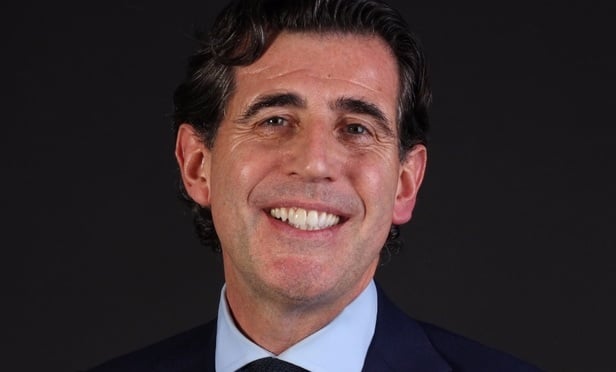'It gives them their lives back' - Slaughters chief on what AI means for associates
Magic circle firm signs up to use artificial intelligence software
September 14, 2016 at 03:56 AM
4 minute read
Slaughter and May M&A associates are not about to see their jobs replaced by robots, says senior partner Steve Cooke, following the firm's adoption of new artificial intelligence (AI) technology.
The firm has been working with Luminance Technologies – which has been funded by Autonomy co-founder Mike Lynch's tech investment firm Invoke Capital – to test and pilot the software, which Luminance claims will transform the due diligence process on M&A deals.
Cooke agreed to work with Luminance on the back of a longstanding working relationship with Lynch – Slaughters advised Autonomy on its 2011 sale to Hewlett Packard, with Cooke taking a lead role. "I happened to have lunch with Mike Lynch and the idea of AI due diligence came up. We took it from there," says Cooke.
He adds that the firm had been monitoring AI for some time. "There didn't seem to be any viable options before we agreed to this deal; nothing struck us as being a great leap away from what we do currently."
Cooke argues the new system will be helpful for junior lawyers, who currently have to sift through reams of data as part of the due diligence process. "It gives them their lives back. A lot of the due diligence work is not the most exciting work for lawyers."
Luminance chief executive Emily Foges adds that the benefits of the software include the fact it reports on lawyers' progress. "It shows associates which trainees are assigned to which area and their notes and questions. There is a tight feedback loop."
Other benefits include the fact it is not based on keyword search queries. Instead, the Luminance technology operates without preconceptions and can analyse documents at a glance and identify risks. In addition, it can also sort documents by language, clause type, currency and geolocation.
There are no plans to downsize in lawyer numbers as a result. "There has been talk about robots taking over lawyers for some time. That is not what Luminance is about. I don't see it replacing lawyers though, they will simply be able to focus on the more interesting aspects."
Slaughters plans to use Luminance for approximately 50% of its London-based M&A deal work. "We will start with a safety net and use Luminance side by side with normal document review," says Cooke. He adds that the firm is also considering rolling out the technology to other London practices and Asia.
The key partners involved in collaborating with Luminance and running the pilot are corporate partners Sally Wokes and Murray Cox, technology head Rob Sumroy, finance partner Ed Fife and competition partner Anna Lyle-Smythe. Overall, 40-45 trainees and associates were involved in its development, and the system was tested directly on around 20 of them.
The firm confirmed that it did not provide any funding for Luminance, nor did it waive fees in return for a stake as it did not charge Luminance for its non-legal advice during the pilot process.
Slaughters is the only law firm to have piloted Luminance prior to its launch, though several others are also understood to be interested in the technology.
"When we piloted it we used live transactions and used Luminance to shadow our regular document review," says Cooke, who declined to comment on the transactions and clients involved.
Luminance was founded by a combination of lawyers, M&A experts and mathematicians, while Invoke Capital, which was founded by Lynch and members of the senior management team at Autonomy, has access to $1bn (£700m) in capital.
Slaughters' move comes as a growing number of firms introduce AI systems, with CC signing a deal with Kira in July. DLA Piper also signed a deal with Kira in June – its first use of AI technology. In March, Kira also signed a deal with Deloitte, allowing the Big Four accountancy firm to use its machine-learning technology to review documents related to M&A deals, investigations and contract management. Fellow magic circle firm Linklaters announced a deal with rival technology company RAVN in May, allowing its lawyers to use RAVN's services for a number of automated tasks.
This content has been archived. It is available through our partners, LexisNexis® and Bloomberg Law.
To view this content, please continue to their sites.
Not a Lexis Subscriber?
Subscribe Now
Not a Bloomberg Law Subscriber?
Subscribe Now
NOT FOR REPRINT
© 2025 ALM Global, LLC, All Rights Reserved. Request academic re-use from www.copyright.com. All other uses, submit a request to [email protected]. For more information visit Asset & Logo Licensing.
You Might Like
View All
Hengeler Advises On €7B Baltica 2 Wind Farm Deal Between Ørsted and PGE
2 minute read
Israeli Firm Pearl Cohen Combines with San Francisco IP Boutique


Trending Stories
- 1Uber Files RICO Suit Against Plaintiff-Side Firms Alleging Fraudulent Injury Claims
- 2The Law Firm Disrupted: Scrutinizing the Elephant More Than the Mouse
- 3Inherent Diminished Value Damages Unavailable to 3rd-Party Claimants, Court Says
- 4Pa. Defense Firm Sued by Client Over Ex-Eagles Player's $43.5M Med Mal Win
- 5Losses Mount at Morris Manning, but Departing Ex-Chair Stays Bullish About His Old Firm's Future
Who Got The Work
J. Brugh Lower of Gibbons has entered an appearance for industrial equipment supplier Devco Corporation in a pending trademark infringement lawsuit. The suit, accusing the defendant of selling knock-off Graco products, was filed Dec. 18 in New Jersey District Court by Rivkin Radler on behalf of Graco Inc. and Graco Minnesota. The case, assigned to U.S. District Judge Zahid N. Quraishi, is 3:24-cv-11294, Graco Inc. et al v. Devco Corporation.
Who Got The Work
Rebecca Maller-Stein and Kent A. Yalowitz of Arnold & Porter Kaye Scholer have entered their appearances for Hanaco Venture Capital and its executives, Lior Prosor and David Frankel, in a pending securities lawsuit. The action, filed on Dec. 24 in New York Southern District Court by Zell, Aron & Co. on behalf of Goldeneye Advisors, accuses the defendants of negligently and fraudulently managing the plaintiff's $1 million investment. The case, assigned to U.S. District Judge Vernon S. Broderick, is 1:24-cv-09918, Goldeneye Advisors, LLC v. Hanaco Venture Capital, Ltd. et al.
Who Got The Work
Attorneys from A&O Shearman has stepped in as defense counsel for Toronto-Dominion Bank and other defendants in a pending securities class action. The suit, filed Dec. 11 in New York Southern District Court by Bleichmar Fonti & Auld, accuses the defendants of concealing the bank's 'pervasive' deficiencies in regards to its compliance with the Bank Secrecy Act and the quality of its anti-money laundering controls. The case, assigned to U.S. District Judge Arun Subramanian, is 1:24-cv-09445, Gonzalez v. The Toronto-Dominion Bank et al.
Who Got The Work
Crown Castle International, a Pennsylvania company providing shared communications infrastructure, has turned to Luke D. Wolf of Gordon Rees Scully Mansukhani to fend off a pending breach-of-contract lawsuit. The court action, filed Nov. 25 in Michigan Eastern District Court by Hooper Hathaway PC on behalf of The Town Residences LLC, accuses Crown Castle of failing to transfer approximately $30,000 in utility payments from T-Mobile in breach of a roof-top lease and assignment agreement. The case, assigned to U.S. District Judge Susan K. Declercq, is 2:24-cv-13131, The Town Residences LLC v. T-Mobile US, Inc. et al.
Who Got The Work
Wilfred P. Coronato and Daniel M. Schwartz of McCarter & English have stepped in as defense counsel to Electrolux Home Products Inc. in a pending product liability lawsuit. The court action, filed Nov. 26 in New York Eastern District Court by Poulos Lopiccolo PC and Nagel Rice LLP on behalf of David Stern, alleges that the defendant's refrigerators’ drawers and shelving repeatedly break and fall apart within months after purchase. The case, assigned to U.S. District Judge Joan M. Azrack, is 2:24-cv-08204, Stern v. Electrolux Home Products, Inc.
Featured Firms
Law Offices of Gary Martin Hays & Associates, P.C.
(470) 294-1674
Law Offices of Mark E. Salomone
(857) 444-6468
Smith & Hassler
(713) 739-1250









